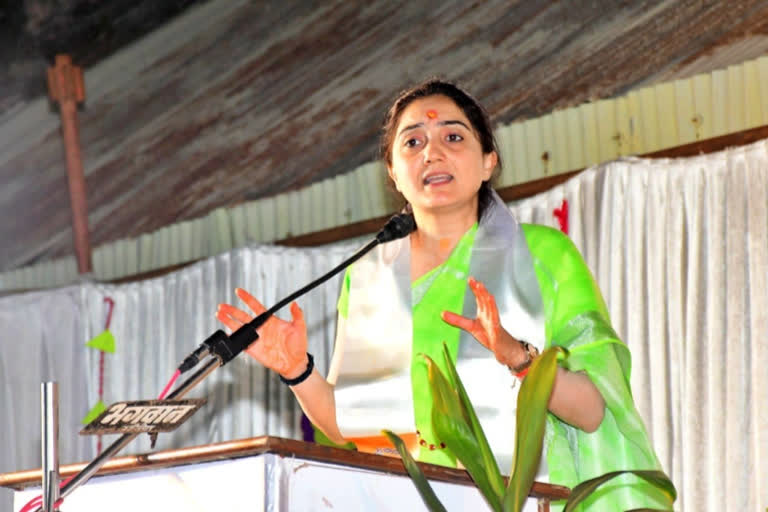New Delhi:With the backlash against India continuing unabated on the controversy erupting after BJP leaders made ‘hateful and derogatory remarks on Prophet Muhammad', many Muslim countries including Iran, Egypt, Saudi Arabia, Qatar, Kuwait, and Pakistan among others besides the Organisation of Islamic Cooperation (OIC) have issued strong statements of condemnation and summoning the Indian envoys to register their protest.
The controversy was triggered by the comments made on TV by BJP national spokesperson Nupur Sharma and the Delhi media head Naveen Kumar Jindal, against whom the BJP has already announced prompt action by suspending and divesting them from responsibilities including stripping them of their party posts. But judging from the reaction in West Asia, the damage may already have been done and will require a superlative effort by Indian diplomats to undo it.
First, from the economic point of view, countries of West Asia, mostly Muslim by faith, may restrict the market for Indian goods, something India has been able to make its presence felt. There may also be restrictions imposed on the Indian-origin workforce in these countries which may manifest in increasing restrictions in issuing working visas. It would also result in negating the investment India made in recent years to develop closer ties with Saudi Arabia and the UAE.
Second, a cornerstone of Indian strategic outreach is the “Act East Policy” (AEP) which seeks closer economic, political and cultural ties with the ASEAN, where about 42% of the population is Muslim and only 18% Buddhist and 17% Christian. The possibility of a backlash against India due to the controversy is now stronger. Already, there is a legacy factor. In 2020, India had hit back with restricted palm oil imports from Muslim-majority Malaysia when its PM had panned India on the abrogation of Article 370 and trifurcation of Jammu and Kashmir besides criticising India’s Citizenship Amendment Act (CAA).
Also read:Saudi joins list of Gulf countries condemning remarks on Prophet: Updates in 10 points
Third, a setback in ASEAN would make a dent in India’s Indo-Pacific policy to counter Chinese influence in the East and Southeast Asian region. Fourth, Indian influence would also wane in the strategically located Muslim- dominated Maldives Islands in the Indian Ocean where anti-India feelings run notably high and India is pitted in a duel for influence with China.
Fifth, an important but unstated element of Indian foreign strategy has been the marginalization of Pakistan within the Muslim world in which India had succeeded to some extent. But the eruption of the controversy and the alignments in the Muslim world would severely blunt the Indian policy. Already, the voices of many Islamic countries have come in unison with that of Pakistan.
Sixth, it would give a fillip to the militant Islamist component of the Kashmiri secessionist movement resulting in further radicalisation and increased acts of terror in the Valley. Said Kumar Sanjay Singh, a strategic affairs analyst who teaches history in a Delhi University college: “The long and the short of it is that it would be an unmitigated disaster for Indian’s foreign policy. Already the entire Muslim world including the OIC and even Iran are up against what has happened in India.” “Prophet Muhammad is revered by all sects of Islam. India has a substantial Shia and Sunni population. Internationally and domestically, this controversy over the hate comments has the ability to dissolve many differences or at least bridge many divides in the Ummah,” he added.
Interestingly, the developments come in the backdrop of a US State Department’s ‘Report on International Religious Freedom 2021’ that was released last Thursday (June 2, 2022) which indicted India on the state of religious freedom. Citing an unflattering example of India, Antony Blinken, US Secretary of State, said on Thursday: “For example, in India, the world’s largest democracy and home to a great diversity of faiths, we’ve seen rising attacks on people and places of worship.”
The State Department report follows the report of the US Commission on International Religious Freedom (USCIRF) report for 2022 that was released on April 25, 2022. The USCIRF report had listed India as a ‘Country of Particular Concern’ (CPC) placing it in a group of 15 countries which includes Russia, China, Taliban-controlled Afghanistan, Burma, Eritrea, Iran, Nigeria, North Korea, Saudi Arabia, Syria, Tajikistan, Turkmenistan, and Vietnam.
Also read:'Focus on your own minority issues': MEA to Pakistan over reaction on Prophet controversy
